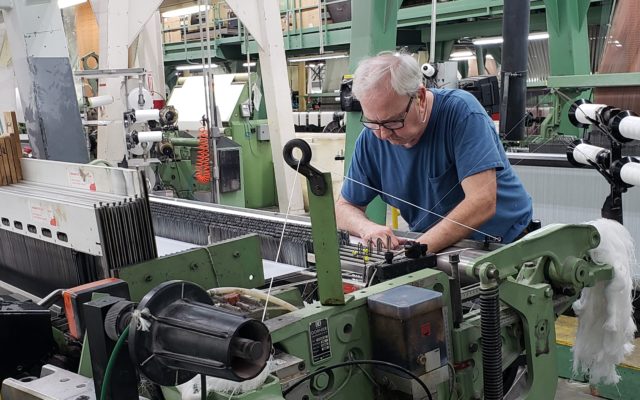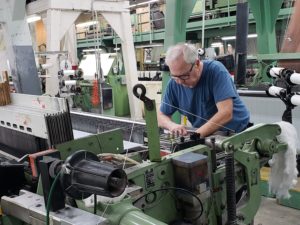
Guilford textile mill shifts from furniture production to clothing for health care workers
GUILFORD — The spread of COVID-19 this spring prodded a Guilford textile mill to act quickly for its own fiscal health.
Duvaltex shifted production priorities from furniture textiles to a range of advanced technical fabrics designed to meet the clothing needs of front-line health care workers as they battle the pandemic.
Serving the health care industry isn’t new for Duvaltex, which for the last 20 years has created fabric for cubicle curtains that, among other uses, serve as privacy dividers between hospital beds.

Bangor Daily News photo/Ernie Clark
DUVALTEX — Joe McAllister of Dover-Foxcroft works on a loom in the weave room at Duvaltex in Guilford on Aug. 11.
But a primary customer for the company over the years has been the office furniture market, and when the pandemic arrived in the United States, the demand for those fabrics quickly dipped as offices around the country closed and more and more employees began working from home.
“Obviously that affects the cash flow,” Duvaltex operations manager Rachael Davis said. “When you stop getting orders you’re not going to have that cash coming in four weeks down the road.”

Rachael Davis, operations manager at Duvaltex.
“We were studying that pace and seeing how orders were flowing, and then we had to make a decision. ‘OK, what do we need to stop producing, or do we keep producing and hope they come back to take their orders that they placed prior to the pandemic?’”
Duvaltex soon laid off 130 of its 220 employees at its Maine facilities in Guilford and Newport.
“We were at the least amount of people we could have but yet still stay operational,” Davis said. “And when I say least, everyone was all hands on deck because we wanted to be sure we could pay the people we still had.”
Duvaltex began converting much of its machinery to produce health care fabrics, a process that took just four weeks thanks in great part to a veteran work force that averages 25 years on the job, Duvaltex project manager Peter Paine said.
“Even though it was still fabric, it was something none of them had dealt with before,” Paine added. “But with their expertise they were quickly able to adjust, and we also had people in other departments that stepped up to help.”

Peter Paine, project manager at Duvaltex.
The fabric now being produced comes in several categories.
Level 1 fabric is for situations with very minimal risk, such as a patient being examined or a visitor entering a room where a patient is in isolation. Level 2 is for low-risk use such as a person having sutures or blood drawn.
Level 3 is for more in-depth cases such as a person having a transfusion, and Level 4 fabric is designed for surgical uses.
“One of the good things about this fabric is that it’s reusable,” Davis said. “With a lot of scrubs, after a one-time use you throw them away or they’re made of paper. This fabric can be washed up to a hundred times, which makes it much more sustainable.”
Sales of those fabrics by Duvaltex received an initial boost through a contract with the Canadian government, and since then the company has been working to build its sales within the United States.
“There really are not a lot of textile manufacturers left in the United States,” Davis said. “Obviously there’s a bunch in China and Asia, it’s just a matter of where [companies] want to source their fabric from.”
The ongoing health care-related work has enabled Duvaltex to re-hire nearly all of its Maine workforce.
“Being just a textile manufacturer, we like to consider ourselves an innovative company with project management in the building so we can make those types of business changes when we need to,” Paine said.
As Duvaltex continues to battle foreign competition within the textile industry, such agility in the marketplace will remain pivotal to the company’s future.
“What’s this pandemic going to mean for the future?” Davis asked. “Is everyone going to be working from home going forward? Is the need for office furniture going to be there?
“We don’t know what the future’s going to look like, and that’s why we as a company need to stay innovative and keep creating different products.”